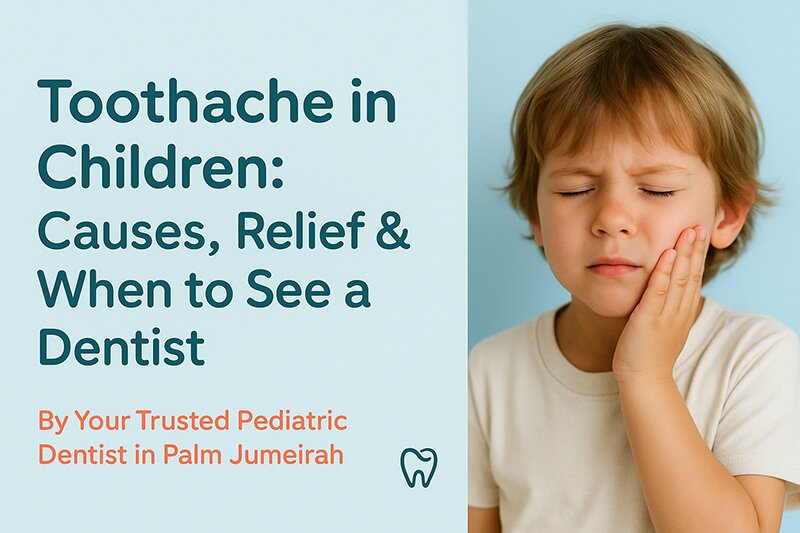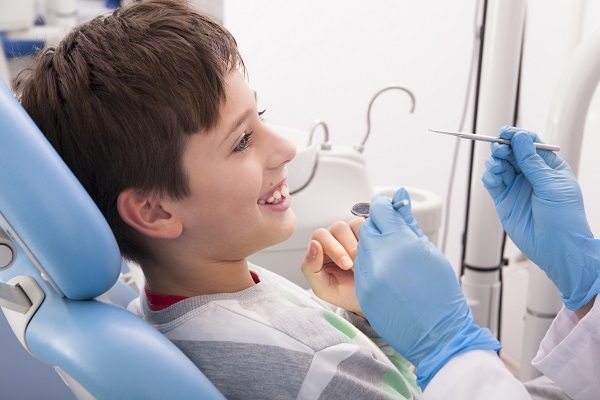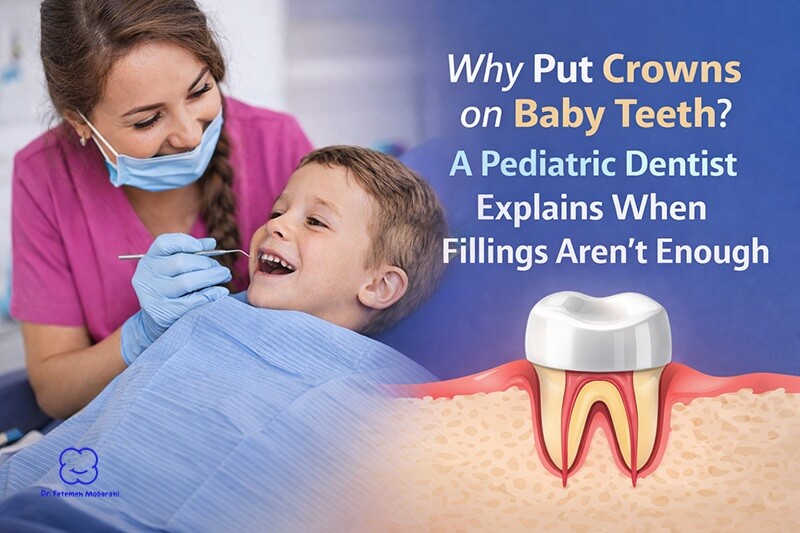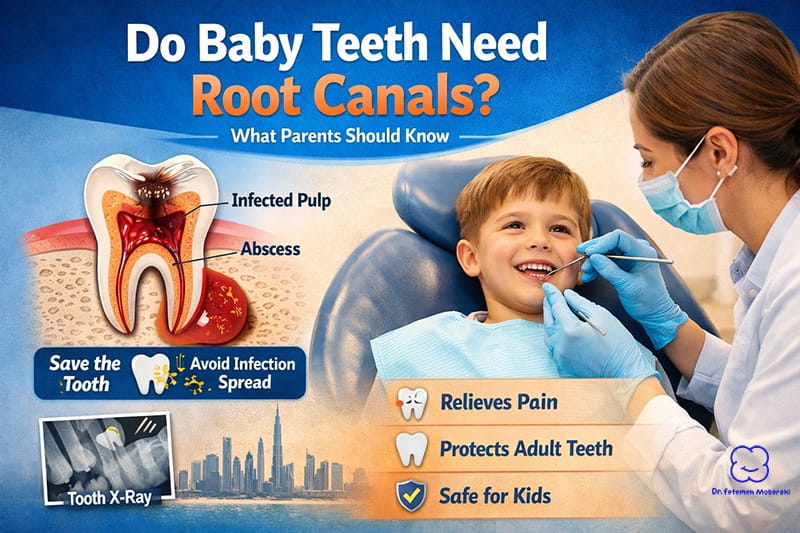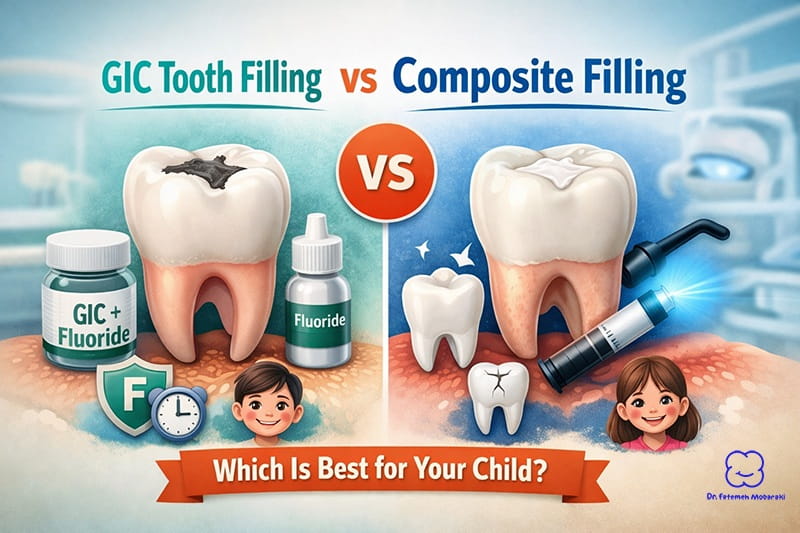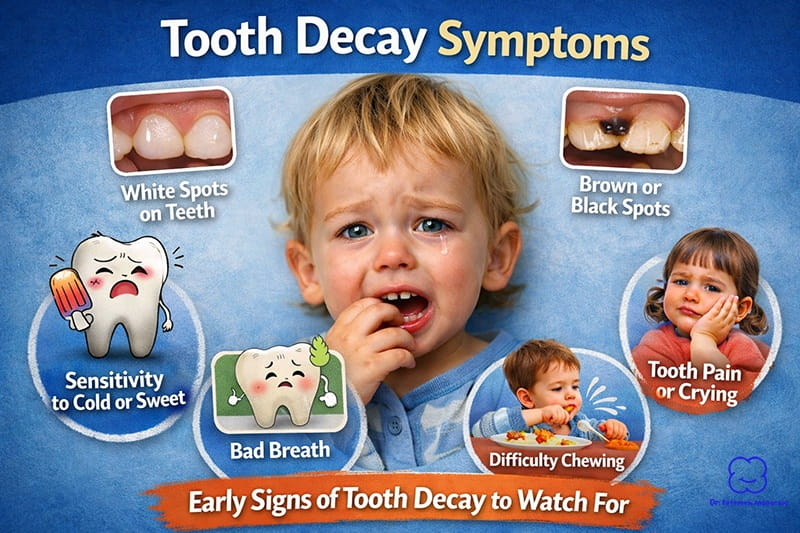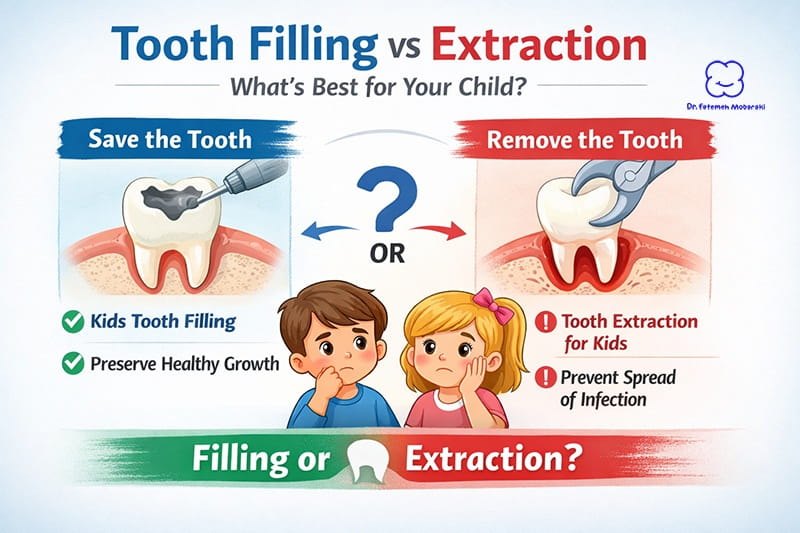Dealing with a child’s toothache can be distressing for both parents and kids alike. Toothache in children, can disrupt their daily activities, including eating, sleeping, and playing. As a pediatric dentist, I’ve encountered numerous cases of children’s tooth pain, and I’m here to provide you with a comprehensive guide to understand, manage, and prevent toothaches in your little ones.
What Causes Toothache in Children?
Toothache in kids can arise from a variety of underlying issues. Understanding these causes can help you act swiftly and effectively to reduce your child’s discomfort and prevent more serious dental problems.
- Dental Cavities: By far the most frequent culprit, cavities develop when plaque and bacteria erode tooth enamel. A high-sugar diet, inadequate brushing, and skipping dental check-ups all contribute to cavity formation. If left untreated, these can progress into painful infections.
- Tooth Eruption: Teething is a natural developmental stage but often brings discomfort. As baby teeth or permanent teeth push through the gums, they can cause soreness and localized swelling. This is particularly common around ages 6 months to 3 years and again from age 6 onward.
- Tooth Abscess: This serious condition results from untreated cavities or trauma. A tooth abscess is a pocket of pus caused by bacterial infection, leading to intense pain, swelling, and sometimes fever. It requires urgent dental treatment.
- Gum Disease (Gingivitis): Poor brushing habits can cause inflammation of the gums, making them red, swollen, and tender. Gingivitis in kids is reversible if caught early but can cause pain and progress to more serious conditions if ignored.
- Dental Trauma or Injury: Children are active and prone to falls or sports injuries. A knocked, chipped, or cracked tooth can expose the sensitive inner parts of the tooth, leading to sharp or lingering pain.
- Orthodontic Issues: Misaligned teeth or overcrowding can put pressure on certain areas of the mouth, leading to discomfort or pain. In some cases, erupting wisdom teeth in older children may also cause similar issues.
- Food Particles or Foreign Objects: Sometimes, the cause is as simple as a piece of food lodged between teeth. Popcorn kernels, fruit skins, or even toothbrush bristles can cause irritation and mimic the sensation of a toothache.
Understanding these potential causes is the first step toward getting your child the right treatment and relieving their discomfort quickly.
Symptoms of Child Toothache
Identifying symptoms early can make managing toothache much easier. Watch out for these common signs:
- Constant throbbing pain or sharp pain when biting
- Sensitivity to hot or cold foods and drinks
- Swelling around the affected tooth
- Fever, headaches, or general discomfort
- Red or swollen gums
- Difficulty chewing or refusal to eat
Home Remedies for Child Toothache
Before heading to your pediatric dentist, consider these safe, temporary home remedies to alleviate toothache:
- Warm Salt Water Rinse: Dissolve half a teaspoon of salt in a glass of warm water. Have your child swish it gently around their mouth for 30 seconds before spitting it out. This can help reduce inflammation, cleanse the area, and ease mild pain.
- Cold Compress: Apply a cold pack or a cloth filled with ice cubes to the cheek near the affected tooth. Use it for 15–20 minutes at a time. This reduces swelling and provides a numbing effect that can relieve sharp or throbbing pain.
- Pain Relievers: Children’s acetaminophen or ibuprofen can be given to manage pain, but always follow the dosage instructions on the label or those given by your pediatrician or dentist. Never apply aspirin directly to a child’s tooth or gums, as it can cause a chemical burn.
- Clove Oil: Known for its natural anesthetic properties, clove oil can temporarily ease pain. Dilute it with a carrier oil like olive oil, then use a cotton swab to apply it directly to the sore area. Ensure your child doesn’t swallow the oil.
- Keep the Area Clean: Sometimes the pain is caused by food debris stuck between teeth. Floss gently around the sore tooth to dislodge any particles. Brushing carefully with a soft-bristled toothbrush can also help maintain cleanliness without aggravating the area.
- Hydration and Soft Foods: Encourage your child to drink water regularly and eat soft, non-irritating foods like yogurt, mashed potatoes, or bananas until the pain subsides. Avoid sugary snacks or very hot/cold foods that could worsen sensitivity.
- Elevate the Head While Sleeping: If your child experiences nighttime toothache, try elevating their head with an extra pillow. This helps reduce blood flow to the area and may minimize pressure and throbbing.
Remember, these remedies are meant for short-term relief and should not replace a proper dental evaluation. If the pain persists for more than a day or is accompanied by swelling, fever, or other severe symptoms, contact your pediatric dentist immediately.
When to See a Pediatric Dentist?
While home remedies can provide temporary relief, professional intervention is crucial in certain situations. Schedule an immediate appointment with your pediatric dentist if your child:
- Experiences severe or persistent pain lasting more than 24 hours
- Shows swelling in the face or gums
- Develops a fever or general illness symptoms alongside toothache
- Has visible damage or trauma to the tooth
- Demonstrates difficulty opening the mouth fully
What to Expect at the Dental Visit
Visiting your pediatric dentist needn’t be intimidating. Here’s what you can expect during the appointment:
- Examination: Your dentist will gently examine your child’s teeth, gums, and mouth to identify the cause of the pain.
- X-rays: X-rays might be recommended to check for underlying issues like cavities or infections below the gumline.
- Treatment: Depending on the issue, treatments may range from filling cavities, prescribing antibiotics for infections, or even tooth extraction if necessary.
- Pain Management: Your dentist will discuss pain management strategies tailored specifically for your child to ensure comfort and quick recovery.
Cultural and Lifestyle Factors Affecting Toothache in Children in Dubai
Dubai’s unique climate, dietary preferences, and lifestyle can all contribute to children’s oral health issues, including toothache. The city’s hot weather often leads children to consume cold or sugary drinks, which—if not followed by proper brushing—can contribute to enamel erosion and cavities. Additionally, traditional treats such as dates and sticky sweets, while nutritious, can easily stick to teeth and create a breeding ground for bacteria if not cleaned properly.
Children in Dubai also tend to stay up late, especially during weekends or festive periods like Ramadan. This can disrupt nightly brushing routines, increasing the risk of tooth decay. Moreover, easy access to processed snacks and sweetened beverages in schools and malls makes it important for parents to monitor their child’s diet and reinforce good dental habits.
As a parent in Dubai, being mindful of these regional factors and maintaining consistent dental care—even during holidays or school breaks—can significantly help in preventing child toothache.
Preventing Future Toothaches
Prevention is always better than cure. Here are practical tips to help prevent future toothaches in your children:
- Regular Dental Check-ups: Schedule regular dental visits every six months with your pediatric dentist.
- Daily Oral Hygiene: Encourage brushing twice a day and flossing daily.
- Healthy Diet: Limit sugary snacks and drinks to reduce cavity risks.
- Fluoride Treatments: Consider fluoride treatments during dental visits to strengthen enamel.
- Dental Sealants: Protective coatings applied to molars can prevent cavities effectively.
Conclusion
Toothache in children can be managed effectively with timely intervention, proper oral hygiene, and routine dental visits. As your dedicated pediatric dentist in Palm Jumeirah, our priority is ensuring your child maintains a bright, pain-free smile. By understanding the causes, recognizing symptoms, and taking proactive preventive steps, you can significantly enhance your child’s oral health and overall wellbeing.
1. Can a toothache resolve itself without treatment?
While minor irritation can sometimes resolve on its own, persistent toothaches require professional assessment to avoid complications.
2. Is toothache common during teething?
Yes, mild pain and discomfort are common during the eruption of new teeth. If the pain seems severe or prolonged, seek a dental check-up.
3. How quickly should we see a dentist after noticing toothache symptoms?
It’s advisable to visit your pediatric dentist within 24 hours, especially if pain persists or is accompanied by swelling or fever.
4. Does toothache always mean a cavity?
Not always. Toothaches can also result from gum disease, tooth eruption, trauma, or infections, which require professional diagnosis.

